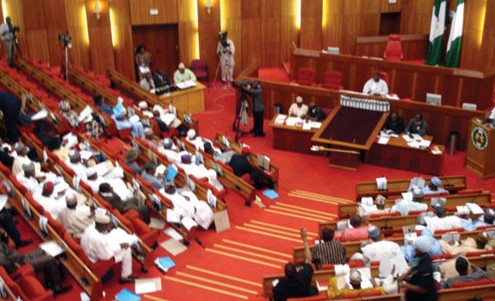Acting President Yemi Osinbajo has withheld his assent to four bills recently passed by the National Assembly, the first time since the present administration took the mantle of leadership on May 29, 2015.
The development comes few days after the Acting President signed seven bills into law.
In four separate letters read by Senate President Bukola Saraki at Wednesday plenary, Osinbajo listed the bills to include: Currency Conversion (Freezing Orders) (Amendment) Bill, National Lottery (Amendment) Bill, Dangerous Drugs (Amendment) Bill and Agricultural Credit and Guarantee Scheme (Amendment) Bill.
The Acting President said he based his action on ‘concerns regarding words and phrases, and the spirit behind the amendment’ as well as ‘existence of pending legal issue’.
Osinbajo said his decision to withhold assent to the four bills was in line with Section 58(4) of the 1999 Constitution (as amended).
The aspect of the law, which dwells on Mode of Exercising Federal Legislative Power, states that: “Where a bill is presented to the President for assent he shall within 30 days thereof signify that he assents or that he withholds assent”.
But relying on Section 58(5) of the Constitution, George Sekibo insisted that the National Assembly can override the president’s veto.
The section states: “Where the President withholds his assent and the bill is again passed by each House by two-thirds majority, the bill shall become law and the assent of the President shall not be required”.
The Currency Conversion (Freezing Orders) (Amendment) Bill whittles down the powers of the President to order forfeiture of assets and transfer such powers to a High Court judge.
The law came into existence as a Decree on 27th March, 1971.
However, Osinbajo said he is withholding his assent to the bill due to concern regarding modalities for the communication of asset forfeiture orders.
The Acting President also explained that the National Lottery Amendment Bill was rejected because there was a pending legal case in court which challenged the competence of the National Assembly to legislate on the matter.
He wrote: “The rationale for withholding assent to the Lottery amendment bill is the existence of pending legal challenge to the competence of the National Assembly to legislate on the subject matter.”
The National Assembly had in amending the Lottery Act transferred the power to grant licence to lottery operators from States to the Federal Government to boost federal revenue.
But raising a Point of Order, Dino Melaye, sponsor of the National Lottery Bill, insisted that the executive must respect the principle of separation of powers.
He said the role of the Executive is to assent to any law passed by the National Assembly, adding that aggrieved citizens can seek legal redress later.
Ruling on the matter, Senate President Bukola Saraki referred it to the Legal Department of the National Assembly for advice and interpretation.
Despite withholding his assent to the bills, BusinessDay gathered that lawmakers can take advantage of Section 58(5) of the Constitution to override the President’s veto.
The section states that: “Where the President withholds his assent and the bill is again passed by each House by two-thirds majority, the bill shall become law and the assent of the President shall not be required”.
By implication, 240 lawmakers are needed in the House of Representatives to override the President’s veto, as against 73 in the Senate.









